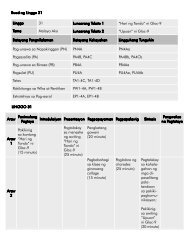Learning Package
Learning Package - baitang7 - WordPress.com
Learning Package - baitang7 - WordPress.com
- No tags were found...
You also want an ePaper? Increase the reach of your titles
YUMPU automatically turns print PDFs into web optimized ePapers that Google loves.
Proverbs are brief instructive expressions that suggest a specific action,<br />
behavior, or judgment. Referred to by some scholars as ―the wisdom of many and the<br />
wit of one‖, they are commonly written in the form of short assertions or poetic two-liners<br />
which have rhyme. It is interesting to note that people are easily struck by proverbs<br />
when they are woven in conversations or writings. This is perhaps because they have<br />
the power to teach people the more essential truths about life and the complexity of<br />
living. Compared to lengthy narrations, descriptions, or argumentations, proverbs are<br />
able to effect quickly a change in view or disposition.<br />
In Filipino, proverbs are called salawikain or sawikain. They prescribe norms,<br />
impart a lesson, or emphasize traditions and beliefs in a community. In the anthology of<br />
Damiana L. Eugenio, she classified proverbs into six categories: (1) proverbs<br />
expressing a general attitude towards life and the laws that govern life; (2) ethical<br />
proverbs recommending certain virtues and condemning certain vices; (3) proverbs<br />
expressing a system of values; (4) proverbs expressing general truths and observations<br />
about life and human nature; (5) humorous proverbs and (6) miscellaneous proverbs.<br />
Below are examples of each category.<br />
1. Proverbs expressing a general attitude towards life and the laws that govern life<br />
Walang ligaya sa lupa na di dinilig ng luha. (Tagalog)<br />
There is no earthly joy that is not watered with tears.<br />
Say liket ban-bantayey ermen. (Pangasinan)<br />
Joy is always guarded by sorrow.<br />
Ang kapalaran ko di ko man hanapin, dudulog lalapit kung talagang akin.<br />
(Tagalog)<br />
The good fortune which is intended for me will come even without my seeking it.<br />
2. Ethical proverbs recommending certain virtues and condemning certain vices<br />
Walang utang na di pinagbayaran. (Tagalog)<br />
No debt remains unpaid.<br />
Dai mo pagpaagahan an magigibo mo ngonyan. (Bikol)<br />
Do not put off for tomorrow what you can do for today.<br />
Ayau mo in kahui pila‟a ha kawa‟an mo bunga. (Tausug)<br />
Do not cut the tree to get the fruit.<br />
3. Proverbs expressing a system of values<br />
Ti nasadot a baro cas carne a nadangro. (Ilokano)<br />
A lazy young man is like foul-smelling meat.<br />
Ang mga tulo singgot sa taong mangguibuhaton paga bayran gayud sa<br />
guihapon. (Boholano)<br />
Grade 7 English <strong>Learning</strong> <strong>Package</strong> 5









